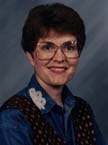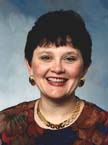



|
Teaching creative writing across the Net
Nebraska teachers teamed up to construct an electronic writers' workshop where young authors from different schools can get advice from professional writers and each other. By Linda Prior |
|
|
|||
 Nancy Hoatson |
In the planning phase of the Y.A.F., Nancy Hoatson, a sixth grade teacher at Sutherland Elementary in Sutherland, Nebraska, was asked to help write a NEB*SAT grant with two high school English teachers. The original grant was written to provide access to the Internet for rural Nebraska schools. These three initial teachers and two high school seniors took a basic Internet course through their Educational Service Unit and together set up and began using the Young Authors Forum. Although she was one of the three teachers to spearhead the project, Hoatson claims to have been "the lucky one they asked to go along for the ride." |
|
There are several reasons Hoatson and English use and administer the Y.A.F. The first reason, as English states it, is that "it is an opportunity for kids in smaller schools to make a connection with other people outside their very small school and to share their poetry and their fiction . . . and to get some kind of response from somebody else besides just their teacher or just the other kids in their class." |
|||
 Cathie English |
Due to this anonymity, authors cannot blame criticism on outside factors; therefore, they tend to heed the suggestions made by reviewers and, as a result, improve their writing. Reviewers enjoy the distance as well and tend to give more honest responses than they might in face-to-face peer editing. |
|
One of the few negative responses Hoatson finds, surprisingly, comes from some of her better writers who opt not to post to the forum for fear others may steal their work or ideas. Hoatson says she doesn't get this very often--only a couple students per year--and deciding not to post to the Forum doesn't affect their grade since it is optional. Some students request further anonymity and use a pen name which Hoatson also finds acceptable. |
|||
|
In training a new school to use the Young Authors Forum, English first sends the teacher a copy of her praxis and writes to them about what she is doing in the classroom with the Y.A.F. Her praxis states the objectives or educational goals of the Forum, then outlines her classroom procedures. Some of the most valuable information comes in the Peer Response section, where she covers the rules, some samples, and grade level appropriateness. This information provides good groundwork for students and teachers and has proven effective. English has students practice their responses focusing on tact, discernment, and grade level awareness during the first semester. By the second semester, when they go online, students are ready to use these guidelines to critique other writers' works. Neither teacher finds many inappropriate or unacceptable submissions or comments. They both lament, however, that each year one or two students test the system. English comments that she regrets the time it takes to focus on this negative aspect, but it is necessary. The other students and teachers in the Forum help in monitoring and are quick to jump on any inappropriateness. English deals with these students who step over the line in her school by taking them off the network, which makes their writing tasks more difficult and could ultimately hurt their grade. The initial training each year takes class time, but the real time-consumers are those things that can't always be done in class: account maintenance, server troubleshooting, Web page design and authoring, and print publishing. These are the activities that show the unquestionable dedication of these two teachers. |
|
Another obstacle English faces in regard to peer response centers around her unique situation of being the largest school involved in the project. She finds it frustrating that not every student in her class gets comments. When this happens, she has the student send his/her work directly to the two professional writers who always come through with comments. This frustration prompts English to monitor activity on the Forum and encourage her students to write to those who aren't getting much feedback. "I was frustrated the first two years because not all of my kids got responses. . . . I wanted each person to have some sort of response. A lot of times, the kids that really stand out and do things off-the-wall, well, everybody writes to them, so I really, really try to encourage my kids to respond to each kid." |
|||
|
Publishing the paper copy of "Writing on the Line" takes a considerable amount of time. The first year Hoatson took on the task, and last year English did the publishing at her school. The two hope to make the book publishing more of a cooperative effort this year and in years to come, but have to overcome hardware and software issues to make that a reality. The cost of publishing the book was covered the first year by the NEB*SAT grant and picked up in subsequent years by the participating schools. |
|
The Young Authors Forum does not plan to simply hold its ground, however. English and Hoatson have plans to improve and expand the project. They would like to have real-time interaction between students to make the personal connections even stronger. They have tried this in the past, but weren't very successful due to scheduling and equipment conflicts. Hoatson and English would like to help their peers understand that the Young Authors Forum is not idle e-mail chit chat. The success of this program is best described by Hoatson."I am," she says, "overwhelmingly pleased with the way it motivates [students] to write and to improve their writing." In the end, that is what it is all about. Read a sample communication between a student poet and Elizabeth Strauss. |
|||
|